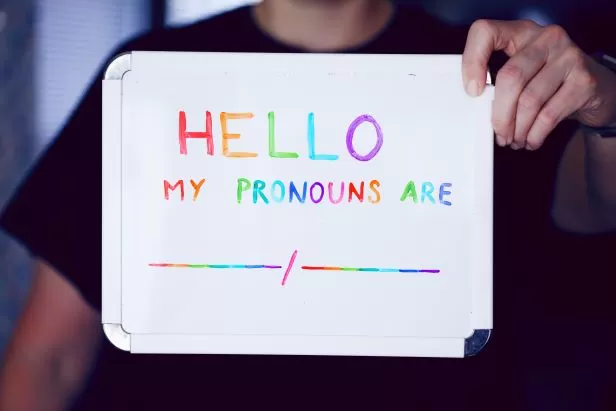
The language we use is powerful and it can directly impact how we make others feel. In the spirit of fostering a more inclusive and empathetic environment, it is important to be an ally and educate oneself about gender identity. This blog post will give some basic definitions and guidance to help work toward a culture of inclusivity and respect.
**
Misgendering
According to resources from Uplift Philly, misgendering is the act of using the wrong pronouns when talking to or about someone. Pronouns are a way to describe someone’s gender and there are many pronouns, including, but not limited to: She/Her/Hers | They/Them/Theirs | He/Him/His | Ze/Zir/Zirs | Xe/Xem/Xyr | It/Its/Itself. Some people use multiple sets of pronouns, often referred to as rolling pronouns.
Rolling pronouns are when more than one set of pronouns are used interchangeably or change over time depending on the individual’s preference. As an example, someone might introduce themselves with the pronouns “he/they”. Many non-binary or gender nonconforming individuals prefer rolling pronouns for identifying gender fluidity. These pronouns may change from day to day or situation to situation and should be respected as such.
Deadnaming
Deadnaming is the act of calling a transgender person by an incorrect name; often the name they were given at birth and no longer use. A person’s chosen name is an integral part of their identity and often reflects their own journey toward self-discovery.
How to avoid misgendering/deadnaming?
If you meet a new person and don’t know their pronouns, don’t make any assumptions based solely on appearance. Asking about someone’s pronouns can feel threatening for transgender people, so instead introduce yourself with your preferred pronouns and see if they share theirs in return. If they don’t, then simply use their name. In order to avoid deadnaming someone, you must commit to using their current name. Even when telling past stories about the person.
Oftentimes, misgendering and deadnaming happen by accident. If you catch your mistake, there is no need to give long-winded excuses. Quickly apologize and correct yourself.
**
For transgender and non-binary individuals, being consistently misgendered and/or deadnamed is deeply hurtful and invalidating. It often triggers feeling of anxiety, depression, and alienation from society. Misgendering and deadnaming can even expose them to anti-trans violence and unsafe experiences. Several studies show that when you use someone’s correct pronouns and name, it drastically decreases that person’s thoughts of suicide, depression, and anxiety. This is especially true for transgender youth.




